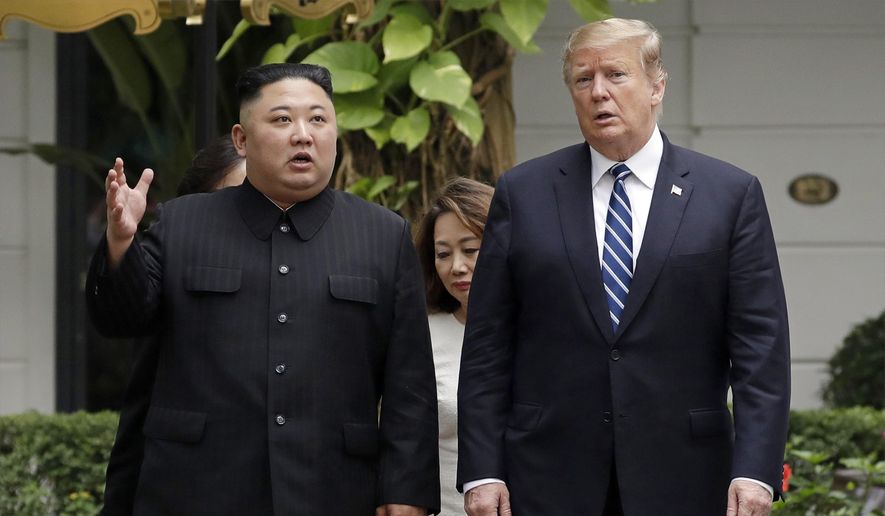President Trump responded cautiously Wednesday to a report that North Korea is restoring a long-range rocket launch site it had promised to dismantle, as the high-stakes nuclear diplomacy with Pyongyang struggled to keep its momentum a week after the president’s summit with North Korean leader Kim Jong-un ended without an agreement in Vietnam.
The president told reporters in the Oval Office he’d be “disappointed” if new rocket activity is occurring in North Korea, but also questioned the veracity of what he described as “very early report” on the matter, which emerged as the administration scrambled to assess the full fallout from last week’s summit collapse.
While the State Department’s envoy for North Korea met in Washington with his South Korean and Japanese counterparts, National Security Advisor John R. Bolton — a renowned hard-liner — has advocated for increasing sanctions against Pyongyang if the Kim regime doesn’t come back to the table soon.
Mr. Bolton’s threat came just as new details surfaced on a clandestine North Korean nuclear site believed to have been a major sticking point that helped produce the impasse at last week’s summit.
During a post-summit press conference in Hanoi, Mr. Trump indicated that U.S. negotiators had revealed details of Pyongyang’s nuclear activities that North Korean negotiators “were surprised that we knew.” Mr. Trump made it clear he was referring to U.S. demands that Pyongyang end — and open to inspection — all of its nuclear facilities, including covert facilities beyond the well-known Yongbyon complex, which the Kim regime has already acknowledged.
South Korea’s Joongang Daily newspaper reported Wednesday that Mr. Trump was alluding to a previously undisclosed uranium-enriching operation at a facility known as Bungang, situated just a short distance away from the Yongbyon complex.
SEE ALSO: Seoul: Increased vehicle movement at North Korea’s ICBM center
There was no immediate comment from U.S. officials Wednesday, although North Korea’s willingness to acknowledge the facility’s existence is likely to factor into the Trump administration’s calculus on whether or not to increase sanctions going forward.
Mr. Bolton told Fox Business Network on Tuesday Washington will be watching closely in the aftermath of the Hanoi summit whether the Kim regime in Pyongyang is really committed to giving up its “nuclear weapons program and everything associated with it.”
“If they’re not willing to do it,” the national security advisor said, “They’re not going to get relief from the crushing economic sanctions that have been imposed on them and we’ll look at ramping those sanctions up.”
The separate report on new work at a long-range rocket launch site in North Korea could also impact the situation. South Korea’s National Intelligence Service briefed lawmakers privately on activities at the North’s Tongchang-ri launch site Tuesday, according to The Associated Press.
An article from 38 North, a website specializing in North Korea security issues, cited commercial satellite imagery that appeared to indicate that efforts to rebuild some structures at Tongchang-ri started sometime between Feb. 16 and March 2 — suggesting the activity may have been occurring while Mr. Kim and Mr. Trump were meeting in Hanoi.
Mr. Trump, who has insisted his diplomatic outreach to the North will continue despite the outcome in Hanoi, said Wednesday that he “would be very disappointed if that were happening.” He added he would be “very, very disappointed in Chairman Kim.” However, the president also stressed that it was “a very early report” and that “we’ll see what happens. We’ll take a look. It will ultimately get solved.”
A high-level source familiar with the U.S.-North Korea negotiations, meanwhile, suggested the reports were overblown, telling The Washington Times on Wednesday that the activity at Tongchang-ri was likely “nothing more than routine maintenance.”
While speculation over the facility swirled, U.S. officials said Special Representative for North Korea Stephen Biegun, who headed working-level talks with the North Koreans in the lead up to last week’s summit, was meeting in Washington Wednesday with his South Korean and Japanese counterparts to fill them in and exchange views on potential next steps in the diplomatic push.
• Guy Taylor can be reached at gtaylor@washingtontimes.com.




Please read our comment policy before commenting.